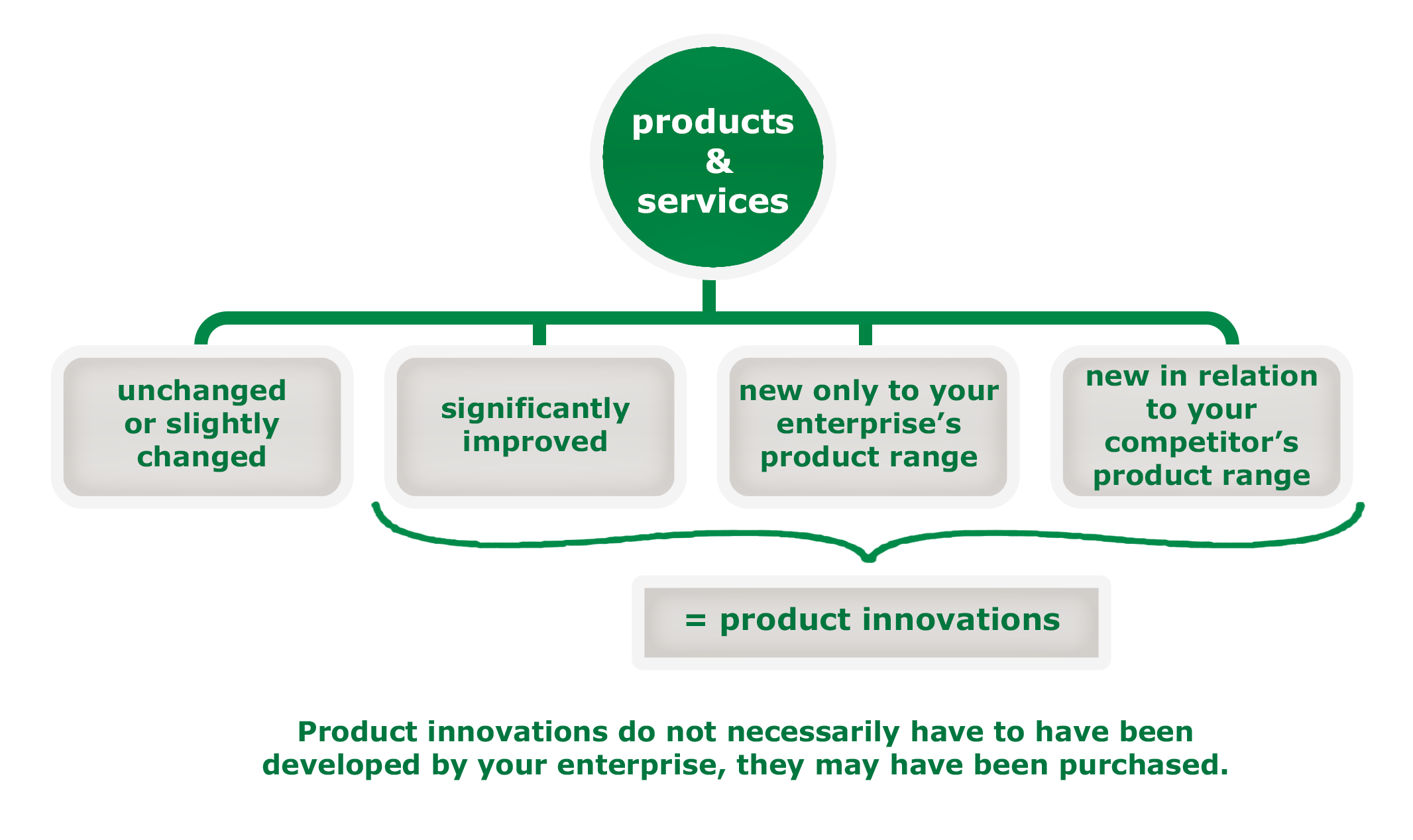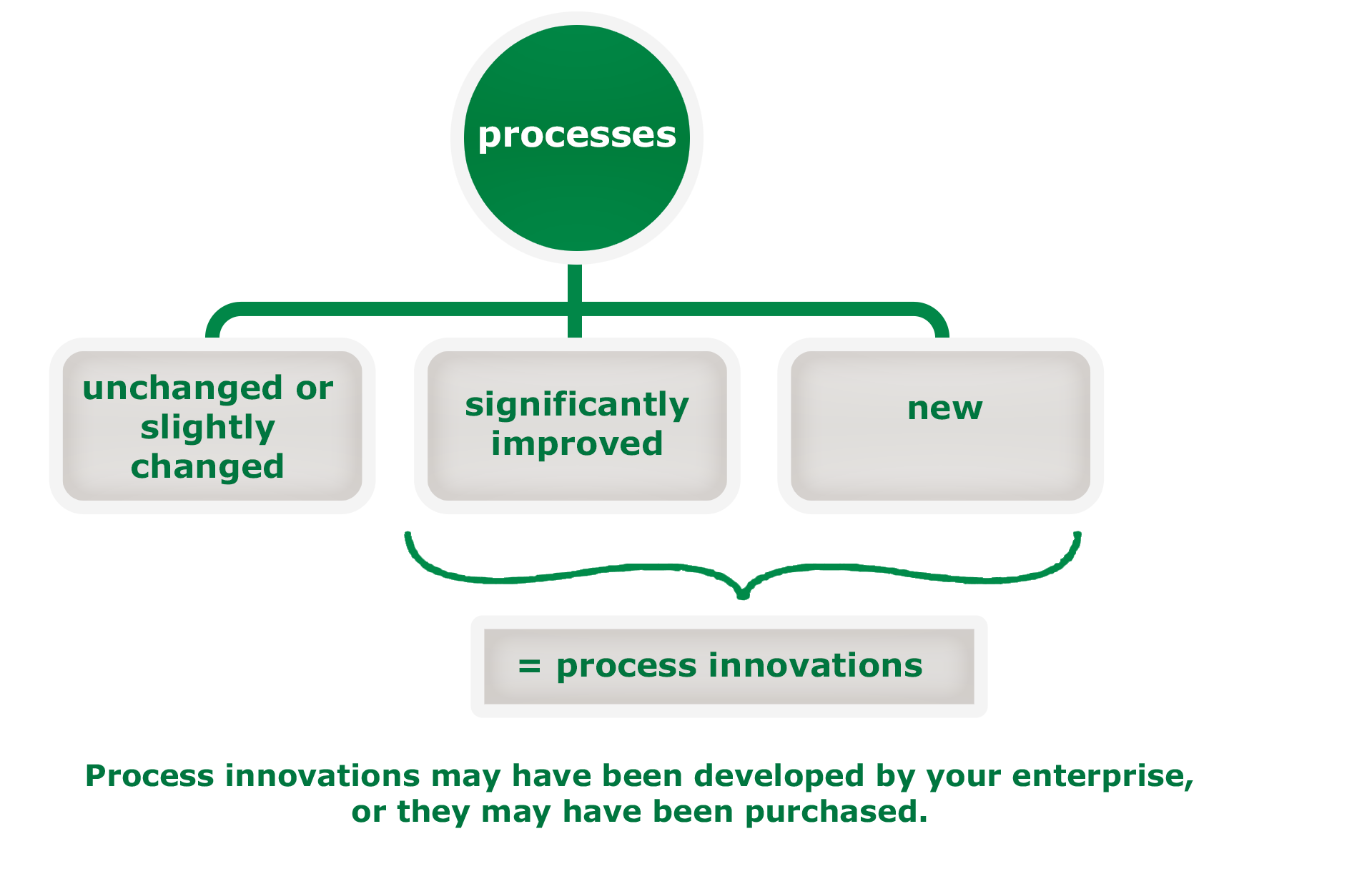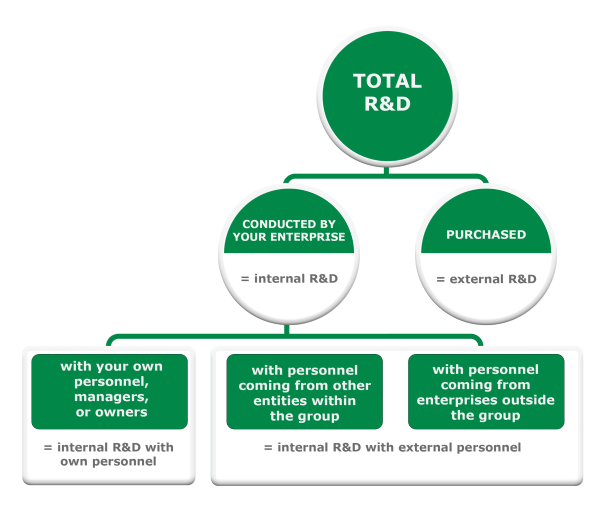New or improved goods
Part 1 - Administrative data
1.1. Enterprise data
Name of enterprise
Enterprise number
Address
Phone number
E-mail
Website
Main activity
Nace code:
Description:
1.2. Who, within the enterprise, is the most suitable person to fill in this questionnaire or to hand over to?
Salutation
First name
Last name
Job title
Phone number
E-mail
Part 2 - Product innovations: new or improved goods or services

2.1. Did your enterprise sell any new or significantly improved products in 2020-2022?
Yes|No
New or improved goods
New or improved services
2.2. Who developed these product innovations your enterprise sold in 2020-2022?
Multiple options are possible
Your enterprise by itself
Your enterprise together with group members, other companies or (government) institutions
Your enterprise, by adjusting or changing products originally developed by other companies (group members or others) or (government) institutions
Mainly byothers: group members, other enterprises or ((government) institutions
2.3. How who you describe your product innovations introduced in the 2020-2022 period?
Yes|No
New compared to your competitors' offer
Identical or very similar to your competitors' offer , but new to your enterprise's offer
2.3.1. What proportion of your total sales in 2022 came from each of the above-mentioned product groups?
An estimate to the best of your abilities suffices
Products (goods or services) which were new compared to your competitors' product range (see 2.3.a.)
approximately %
Products which were identical or very similar to products already offered by your competitors (zie 2.3.b.)
approximately %
Other unchanged or only marginally modified products (including reselling new products purchased from other enterprises
approximately %
Total turnover 2022
%
2.3.2. As far as you know, was one of your product innovations a world first in 2020-2022?
Yes
No
No idea
Part 3 - Process innovations: new or improved processes or methods

3.1. Which of the following process innovations did your enterprise introduce in its operations in 2020-2022?
Yes|No
New or improved:
Methods for producing or developing goods or providing services
Logistics, delivery or distribution methods
Methods for information processing or communication
Methods for accounting or other administrative operations
Business practices for organizing procedures or external relations
Methods of organizing work responsibility, decision making or human resource management
Marketing methods for promotion, packaging, pricing, product placement or after sales services
if you answered "no" on all questions, go to question 3.3
3.2. Who developed these process innovations which your enterprise introduced in its operations in 2020-2022?
Multiple options are possible
Your enterprise by itself
Your enterprise together with group members, other companies or (government) institutions
Your enterprise, by adjusting or changing processes originally developed by group members, other companies or (government) institutions
Mainly by others: group members, other companies, or (government)institutions
Abandoned or suspended innovation activities
3.3. Did your enterprise have innovation activities in 2020-2022 which have not (yet) been implemented in your enterprise?
Yes|No
Abandoned or suspended innovation activities
Innovation activities that were still ongoing by the end of 2022
Completed innovation activities not yet introduced/used by the end of 2022
Part 4 - Research & Development (O&O)

4.1.1. Did your enterprise conduct research and development activities (R&D) in 2020-2022??
Multiple options are possible
Yes|No
R&D carried out under your enterprise's direct supervision or at clients’ premises (= internal R&D)
R&D conducted by a group member, another enterprise or research institution and purchased by your enterprise (= external R&D)
4.1.1.1. How frequently did your enterprise conduct internal R&D activities in 2020-2022?
Continuously (you have employees continuously involved in R&D activities)
Occasionally (as needed only)
4.1.2. Did your company have any innovation activities (including R&D) that did not result in the implementation of an innovation in 2020-2022?
Yes|No
Abandoned or suspended innovation activities
Innovation activities still in progress end of 2022
Completed innovation activities that have not yet resulted in the implementation of an innovation by the end of 2022
If you answered "no" on all options of question 4.1, go to question 4.2.4.
If you answered "no" on all options of questions 4.1 and 4.2, go to question 4.2.4.
4.2.1. Did your enterprise carry out research and development (R&D) in one of the following domains in 2020-2022?
Yes|No
Biotechnology of biochemistry
Nanotechnology
Artificial Intelligence (AI)
4.2.2. How many employees were involved in your internally conducted R&D activities in 2022?
| heads | full-time equivalents(FTE) | |
| Own personnel | ||
| External personnel under your direct supervision |
An estimate to the best of your abilities suffices
Heads|Full-time
equivalents(FTE)|None
Own personnel/managers/owners who contributed to the internally conducted R&D activities in your company or at clients' premises
heads FTE
External personnel (consultants, freelancers, self-employed, academics) from group members or enterprises who worked on internally conducted R&D activities under your company's direct supervision
heads FTE
4.2.3. What were the gross expenses for R&D in 2022?
| Internal R&D | |
| External R&D |
An estimate suffices|None
For internal R&D
€
of which gross wage costs for your own R&D personnel (incl. Social Security contribution by employers, extra-legal benefits, …)
€
of which the cost for external R&D employees (consultants, freelancers, self-employed, academics) who worked on internally conducted R&D activities under your company's direct management
€
of which investments for R&D (buildings, machinery, equipment)
€
of which other operational expenses and overhead costs for R&D
€
External R&D (R&D carried out by a group member/enterprise/institution and purchased by your enterprise)
€
TOTAL
€
Expenditure for innovation activities, other than R&D
4.2.4. What were the gross expenses for non-R&D innovation activities in 2022?
An estimate suffices|None
Gross wage costs for your own personnel working on your innovations or on implementing innovations
€
Purchase of services (e.g. feasibility studies, design, engineering activities, market research, …), materials, supplies for innovation
€
Investments for innovation (machinery, equipment, and buildings)
€
Other non-R&D innovation expenditure, excluding R&D expenditure
€
TOTAL
€
Part 5 - Reasons for not having had (more) innovation activities
5.1. Your enterprise did not have more/any innovation activities during 2020-2022, due to:
Tick one box only
A lack of resources, qualified personnel, material
Other reasons but the lack of resources
No need for (further) innovation activities
Part 6 - Co-operation for innovation and R&D
6.1. Did your enterprise co-operate with a group member, other enterprises, or (public) organizations in 2020-2022?
Multiple options are possible
Yes
on R&D
on innovation activities
on other business activities
No
Go to Part 7
6.1.1. Which partners did your company co-operate with for its R&D or innovation activities in the 2020-2022 period?
Multiple options are possible
Wallonia|Rest of
Belgium|Rest of
Europe*|Rest of
the world
Brussels|Rest of
Belgium|Rest of
Europe*|Rest of
the world
Enterprises within your enterprise group
Enterprises outside your enterprise group
consultants, commercial labs or private research institutions
suppliers (e.g. of equipment, materials, components, software, ...)
clients from the private sector
competitors/other enterprises in your sector
other enterprises
Universities, other institutions for higher education or university hospitals
Public institutions or public research institutions
Clients from the public sector
Non-profit organizations (research centres)
* European Union (excl. United Kingdom), as well as Liechtenstein, Norway and Switzerland
Part 7 - Funding
7.1. Did your enterprise receive public support from the following government services in 2020-2022?
Multiple options are possible
For R&D or
innovation|For other
activities
Regional government agencies
through the Brussels Capital Region (Innoviris, etc.)
through the Walloon region (SPW, etc.)
through the Flemish Region (Vlaio/IWT, etc.)
Federal government
partial exemption from payroll tax for R&D staff (through Belspo)
tax credit or investment deduction for R&D investments
tax exemption for patent income
other
European Union (EU)
through the EU's Horizon 2020 program
other
None of the above
7.2. Did your enterprise seek additional funding in the 2020-2022 period?
Yes, and obtained
it for R&D or
innovation activities|Yes, and obtained
it for other
business activities|Yes, but did not
obtain it|No, no need for it
Equity finance
Debt finance (with/without interest)
Part 8 - Intellectual Property Rights (IPR)
8.1. Did your enterprise in the 2020-2022 period:
Multiple options are possible
apply for a patent?
register an industrial design right?
register a trademark?
claim a copyright?
use trade secrets?
None of the above
8.2. Did your enterprise in the 2020-2022 period:
Multiple options are possible
license out its own intellectual property rights (IPRs) to others
sell its own IPRs (or assign IP rights) to others?
exchange IPRs (vb. via pooling, cross-licensing, etc.)?
None of the above
Part 9 - Innovations with environmental benefits
9.1. Did any of the innovations mentioned above (introduced in the 2020-2022 period) have any of the following environmental benefits, whether intentionally or unintentionally?
Yes,
significant|Yes, but
insignificant|No/N.A.
Environmental benefits obtained within your enterprise
Reduced material or water use per output unit
Reduced energy use or CO2 footprint (reduced total CO2 emission)
Reduced soil, light, noise, water, or air pollution
Replaced some materials with less polluting or hazardous substitutes
Replaced a share of fossil fuel energy with renewable energy sources
Recycled waste, water, or materials for own use or sale
Protection of biodiversity
Environmental benefits obtained during consumption or use by the end user
Reduced energy use or CO2 footprint
Reduced soil, light, noise, water, or air pollution
Facilitated recycling of product after use
Extended product life through longer-lasting, more durable, or easier-to-repair products
Protection of bio-diversity
9.2. During 2020-2022, how important were the following factors in driving your enterprise's decisions to introduce innovations with environmental benefits?
Tick one box for each line.
Degree of importance
High|Medium|Low|Not relevant
Existing environmental regulations
Existing environmental taxes, charges or fees
Environmental regulations or taxes expected in the future
Government grants, subsidies or other financial incentives for environmental innovations
Current or expected market demand for environmental innovations
Improving your enterprise’s reputation
Voluntary actions or initiatives for environmental good practice within your sector
High cost of energy, water or materials
Need to meet requirements for public procurement contracts
9.3. During 2020-2022, how important were the following factors related to climate change for your business?
Tick one box for each line
Degree of importance
High|Medium|Low|Not relevant
Government policies or measures related to climate change
Increasing customer demand for products that help mitigate or adapt to climate change (e.g. low-carbon products)
Increasing costs or input prices resulting from climate change (e.g. higher insurance fees, higher prices for water, adaptation of processes or facilities)
Impacts of extreme weather conditions (e.g. damages/disturbances)
Part 10 - Economic data
10.1. What was the enterprise's average number of persons employed?
|corrections
Headcount in 2020
heads heads
Headcount in 2022
heads
10.2. What was your enterprise's total turnover?
|corrections
Turnover in 2020
€ €
Turnover in 2022
€
10.3. How were sales in 2022 distributed geographically?
Sales within Belgium
approximately %
Export within Europe*
approximately %
Export to the rest of the world
approximately %
TOTAL
approximately %
* European Union (excl. the United Kingdom), as well as Liechtenstein, Norway and Switzerland.
10.4. Was your enterprise part of an enterprise group in 2022?
|any necessary corrections
No
Yes
as the parent company*
as a branch/subsidiary with 50% or less participation by the parent company
as a branch/subsidiary with more than 50% participation by the parent company
* "global ultimate owner"
10.4.1. Where was your group's parent company* located in 2022 ?
Tick one box only
|corrections
Belgium
Abroad,
namely
Part 11 - Supplementary question
11.1. Did your enterprise notice an influence on its operations in the 2020-2022 period from the following occurrences?
If yes, as follows:
Negative|Neutral|Positive|No/N.A.
Economic crisis (e.g. financial crisis, recession, ...)
Sudden price increases (e.g. energy crisis, inflation, ...)
Material or labor shortages
Natural phenomena (e.g. disasters, extreme drought/floods, ...)
Disease in humans/animals/crops (e.g. COVID, bird flu, mildew, …)
Security conflicts (e.g. war, terror attacks, ...)
Other crises, namely
11.1. Has your company undertaken the following actions with one or more group companies in 2020-2022?
Yes,
other entreprises
in Belgium|Yes,
other entreprises
abroad|No
Incoming flows from other enterprises within the group
transfer of technical knowledge
transfer of financial means
transfer of personnel
Internalization of activities
Outgoing flows to other enterprises within the group
transfer of technical knowledge
transfer of financial means
transfer of personnel
outsourcing of activities
Part 12 - Comments and suggestions
Comments on your answers or suggestions for improvement of the questionnaire
Thank you for answering this questionnaire.
Click the "Finish" button at the bottom right of this page
to close the survey.